Securing Anies Baswedan’s Support
Pramono Anung successfully secured Anies Baswedan’s support in the Jakarta gubernatorial election. There seems to be a political deal ahead of 2029.
maaf email atau password anda salah

Pramono Anung successfully secured Anies Baswedan’s support in the Jakarta gubernatorial election. There seems to be a political deal ahead of 2029.
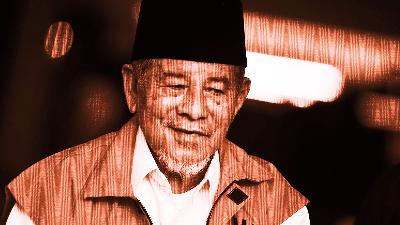
The term “Medan Block” emerged during the trial of former North Maluku Governor, Abdul Gani Kasuba. Medan Block is believed to refer to pre-allocated nickel mining concessions in Halmahera.

Bobby Nasution is suspected of managing the Medan Block nickel mine since 2021. He met with Abdul Gani Kasuba before becoming the Mayor of Medan.
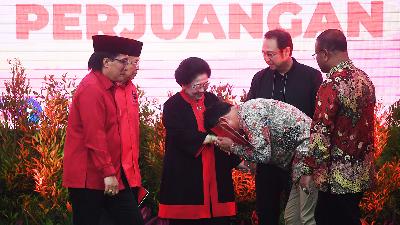
The PDI-P will be nominating Anies Baswedan in the Jakarta gubernatorial election. A popular candidate against Jokowi’s coalition.

The opportunity for Anies Baswedan to contest the Jakarta gubernatorial election is slipping away after the coalition of parties supporting him fell apart. There is a guerrilla from the Palace.

An exclusive Tempo interview with Anies Baswedan regarding his chances to run in the Jakarta regional head election.

Jokowi and Prabowo’s coalition are maneuvering to thwart Anies Baswedan’s candidacy in the Jakarta regional head election. Cabinet posts are being offered as inducements.

Chances for Anies Baswedan to run in the Jakarta regional head election are beginning to open up. A number of political parties support Prabowo Subianto intend to nominate Anies.
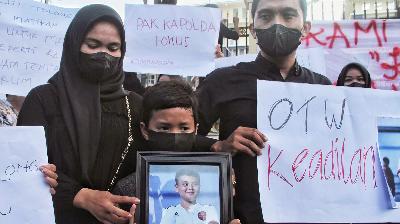
Thirteen-year-old Afif Maulana was found dead under a bridge in Padang, West Sumatra. He had allegedly been tortured by the police.

The number of Indonesian umrah minor pilgrimage travelers grows during the fasting month of Ramadan. The nation’s umrah economic potential has not been fully harnessed.

A defendant of the Supreme Court justice bribery case is allegedly subjected to extortion by someone claiming to represent the leadership of the KPK. The name Firli Bahuri is also implicated.
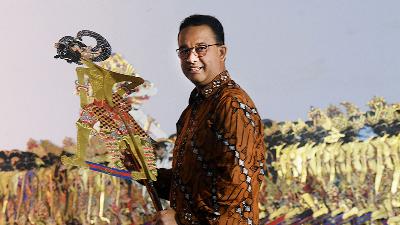
Anies Baswedan talks about the campaign. He admits there are talks with the Ganjar-Mahfud team.

The claim that the Gunung Padang site is the oldest pyramid in the world is strongly challenged. A collaboration of researchers from around the world is needed.
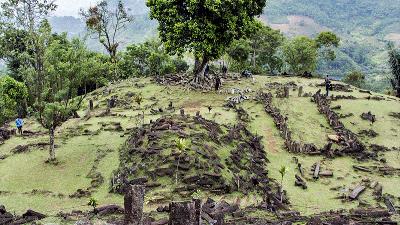
Foreign archeologists doubt the site of Gunung Padang as the world’s oldest pyramid. A journal publisher is going to investigate.

Moh. Wijdan, Head of Ketapang Jaya village, Ketapang, Sampang, East Java, replies to Pressure from the Police and Prosecutors article.
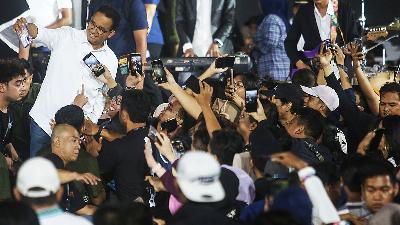
Anies Baswedan is campaigning aggressively through TikTok. It is forbidden to talk about politics and campaigns.

Several high-ranking veterans formerly supporters of Jokowi and Prabowo switched their allegiance to Anies Baswedan. Several officers held disappointment.
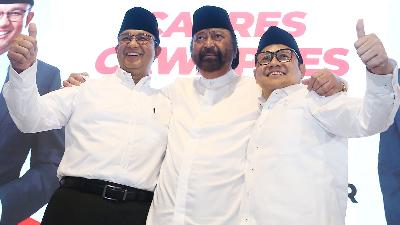
Anies Baswedan choses Muhaimin Iskandar to be his vice-presidential running mate. Agus Harimurti Yudhoyono is eliminated in the final turn.
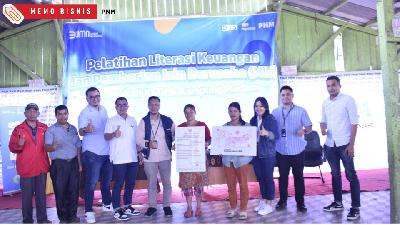
The concept of Kampung Madani is to optimize the business and economic potential of the region. #InfoTempo

A family of Sumatran tigers died after being caught in snare traps in Aceh. With a population of about 600, this endangered wild animal is threatened by poaching, loss of habitat, and conflict with humans.

Poaching produce in the North Natuna Sea is not only triggered by economic need. According to the Director of the Fleet Monitoring and Operations of the Marine and Fisheries Resources Directorate-General in the Maritime Affairs and Fisheries Ministry, Pung Nugroho Saksono, a conflict similar to the Sipadan-Ligitan case between Malaysia and Indonesia should not be allowed to recur.

Corruption Eradication Commission (KPK) investigator, Novel Baswedan, has doubts about his alleged assailant Brig. Rahmat Kadir Mahulette’s statement, calling him a traitor.

MEDAN Mayor Tengku Dzulmi Eldin’s alleged bribery case has roped in a number of parties, from bureaucrats to businessmen.

THE ivory hornbill or rangkong is a symbol of courage and bravery for Dayak community in Kalimantan. The bird is also considered a protector, and acts as the bridge which connects the souls of their ancestors with the Dayaks. Despite this, in the past three years, the population of the ivory rangkong has depleted alarmingly. In 2015, international conservation organizations announced its status as critically endangered.
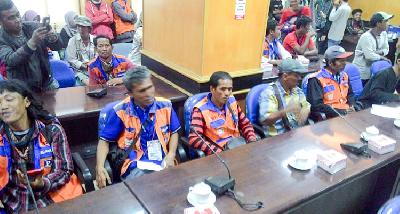
Parking attendants in Makassar were given paralegal training by the Makassar Legal Aid Institute. The program aims to improve legal awareness and embolden participants to fight corruption.

THE Civil Society Coalition has worked with Change.org to launch a petition demanding President Joko Widodo to form a joint fact-finding team (TGPF) to investigate the attack using acid against Corruption Eradication Commission (KPK) investigator Novel Baswedan.

Sartono Kartodiredjo’s dissertation Pemberontakan Petani Banten 1888 (The Peasants’ Revolt of Banten in 1888) and Catatan Harian Imam Samudra (Imam Samudra’s Diaries) were two texts that significantly influenced Jompet Kuswidananto’s work On Paradise, exhibited at the Museum of Contemporary Arts, Grand-Hornu, Belgium.

Organic coffee farming in Kiadan Plaga is the main source of income. It is also a vehicle for the village’s brand of ecotourism.~

Rizieq Syihab, charged in a pornography offense, did not show up at his scheduled questioning at the Jakarta police headquarters on April 25. He said he wanted to travel to Mecca, Saudi Arabia, to perform the lesser pilgrimage (umrah). This Grand Imam of the Islam Defenders Front (FPI) promised he would be present for questioning upon returning from the Holy Land in mid-May. However, the post-Ramadan fasting month holiday has passed and he has yet to return to Indonesia.

Anies Baswedan took advantage of the final week of the campaign to emphasize his rejection of land reclamation work on the north shore of Jakarta. On Wednesday last week, Anies, who is running for the office of the Jakarta governor, endorsed by the Gerindra Party and Justice and Prosperity Party (PKS) went to the dock in Cilincing, North Jakarta. He took part in the parade with the theme "Fishermen Reject Land Reclamation."
There were 150 ships there, each carrying 10 fishermen, which sailed in a convoy on Jakarta Bay, from Kalibaru dock to Cilincing. These fishing boats visited Island G, an island where work had once stopped, which is being worked on by the Agung Podomoro Land company. They put up a banner there which read "Reject Land Reclamation."

Friday last week was a busy day for 47-year-old Anies Baswedan, who began his day's activities from early morning. His schedule was full and it did not end until nearly midnight. "I haven't slept much," said Anies.
That day, Anies, the former education and culture minister, was selected a candidate in the Jakarta gubernatorial election, by the Gerindra Party and the Justice and Prosperity Party (PKS). His running mate is Sandiaga Uno, a Gerindra member and businessman. There was a series of events he had to attend following his nomination: the public declaration of his candidacy, registration at the Jakarta General Elections Commission (KPUD) and political meetings. At the end of that Friday, Tempo reporter Prihandoko had a chance to interview Anies about his nomination

THE four big mammals that have always been the focus of World Wildlife Fund (WWF) Indonesia, according to Arnold Sitompul, are tigers, orangutans, elephants and rhinoceroses. It is not just because they are endemic to the islands of Sumatra, Java and Kalimantan. The animals are listed by the International Union for Conservation of Nature (IUCN) as critically endangered. "These species have always been our main concern because they are endemic to Indonesia, and so they've always been our priority," Arnold told Tempo.
Out of the four endangered mammals, the most threatened are the Sumatran rhinos (Dicerorhinus sumatrensis), of which only about 300 are left in the wild. Meanwhile, the population of Sumatran elephants (Elephas maximus sumatranus) plummeted by 50 percent in less than 10 years. Arnold recently spoke to Tempo English reporter Amanda Siddharta on WWF Indonesia's efforts to conserve these iconic beasts. Excerpts:

The huge education budget20 percent of the total state budgetdemands a significant improvement in the quality of the national education system, something that Indonesians have been yearning for years. Now, it is up to Education and Culture Minister Anies Baswedan to respond to those demands.
The first step that Anies has started is publicizing all data on public education. The Education Balance Sheet publication contains information that until recently was not available to the public, such as the number of students in schools, the proportion of students to teachers, the number of damaged and broken-down schools, the quality of teachers based on teacher competence evaluations, the different education budgets between national and regional budgets, the budget allocation per student and the number of accredited schools.

This is the story of death. It is begun with somebody's death and ends with your own death. Yes, your death. No need for surprises," Faisal Oddang opens his story in his maiden novel Puya ke Puya. Death is the frame of the whole narrative, binding the subplots throughout the 218-page novel.
Yet, death here is not described in fear or anxiety. Faisal sets it with the background of the Toraja community that views death as something intimate. "Most Torajans celebrate death and keep it as close as possible in their memories," writes Faisal.

It is increasingly clear that the charges against Corruption Eradication Commission (KPK) investigator Novel Baswedan were mostly fabricated. The National Ombudsman found suspected fraud in the police investigation. The prosecution's case against Novel, concluded the Ombudsman, should not even have qualified for a court hearing.
Irregularities were first suspected when a 2004 resolved case involving Novel was regurgitated. He was, at the time, posted in a Bengkulu district police precinct and charged with allegedly allowing his subordinates to torture some bird-nest thieves. The case should have been closed after Novel was given a strong warning that same year. Unfortunately, the police dug it up when Novel, as a KPK investigator, exposed the corruption inside the National Police traffic division.

After the noon prayers, Irzal Rakhmadani, 24, packed his things in a rucksack and went out. Two items he never goes without are his stethoscope and sphygmometer. He would ride on his motorbike to the office of the World Wild Fund for Nature (WWF) in Palangkaraya, Central Kalimantan, three kilometers away. There, he would treat people suffering from the effects of forest fire smoke around Palangkaraya. In 2015, he treated some 1,000 patients.
In mid-September, Irzal and his colleagues visited a camp for workers who had been laid off by an oil palm company. Fifteen volunteers of Earth Hour Palangkaraya had gathered to help the smoke victims there. Irzal saw something that distressed him. About 300 people were crammed into a 5x15 meter barrack. Because there was not enough room, tarpaulin tents had been set up outside the barracks. People lived alongside chicken and their pet dogs.

ON the first day that Anies Baswedan began his job as minister for culture and elementary and secondary education a year ago, he knew there would be piles of work ahead of him. Among the many issues that needed to be sorted out was the scarcity of teachers in Indonesia's remote areas. Yet, statistically, there should have been enough teachers to go around. The student-teacher ratio is around 16 to 1. "That's an excess, while in South Korea, the ratio is 30 to 1. Ideally it should be 25 to 1," said Anies, admitting that the problem in Indonesia was one of unequal distribution. In some places such as Papua, the ratio dropped significantly to 75 students for every teacher. So, in May this year, the education ministry initiated the Guru Garis Depan (Frontline Teachers ) program to address the shortage of teachers in the outer parts of the country. So far, 798 teachers have been sent out to teach at 28 regencies. Next year, the number is expected to increase to 3,500. Anies discussed the Frontline Teachers initiative with Tempo English reporters Sadika Hamid, Syari Fani and Amanda Siddharta. Excerpts:

THE Energy and Mineral Resources Ministry has an ambitious plan for next year: raising the budget for the development of renewable energy by 10 times. "The future of Indonesia's development depends on seeking and building renewable energy. We can no longer rely solely on fossil fuel energy, which is bound to become scarce," said Dadan Kusdiana, director of the ministry's section on bio-energy.

A strain of wheat developed by researchers at the Andalas University School of Agriculture in Padang, West Sumatra-the Galur SO-3, or GURI 6 UNAND-has been identified as one of four superior varieties of wheat by the Cereal Plant Research Center last November.

Rice, rendang beef stew, jackfruit curry and many kinds of sambal (chili paste) sit in the front lanjar (guestroom) of Etek Nuraini's traditional rumah gadang house in Nagari Sumpur, in the Tanah Datar regency of West Sumatra. It is early in the month of February. Some 40 guests have gathered, including village elders and West Sumatra Governor Irwan Prayitno. Guests sit on the floor, eating side-by-side. Prayers are recited for the safety and wellbeing of those who will inhabit the house. Family photos hang on the wall. Windows are left open to let sunlight in.
From the vantage of the dining area, the house's spacious interior is in clear view. Six jua (Cassia siamea) pillars grace the building's 17-meter-long sides. Jua, a type of ulin ironwood, is extremely durable: once dry, its impossible to cut it down to size. The walls, meanwhile, are made of surian (Toona ciliata), and floors from bayur (pterospermum javanicum) tree trunks.

Forty young men strain and groan, taut muscles shining with sweat as they haul a jua tree (Cassia siamea) out from a ravine near Singkarak Lake, West Sumatra. The trunk is 11 meters long and will be used as the main pillar in a rumah gadang (traditional Minangkabau house). The house is being built for the heirs of Etek Siti Fatimah in the hamlet of Nagari, Sumpur village, Tanah Datar regency. Etek is what locals call an aunt, or a respected female figure.
The men take turns pulling the tree up and out of the gully. Shortly after noon, they reach the top. After clearing another small rise they toss the trunk down the other side, watching it tumble downhill.

PHOTOGRAPHS of elementary school students hang on the walls of the Ki Hajar Dewantara Building of the Elementary and Secondary Education and Culture Ministry in Jakarta. Most of them show children in remote areas, wearing shabby uniforms but genuine smiles on their faces. The photographs were put up at the request of the new minister, Anies Baswedan, who asked that they be hung everywhere, including in all meeting rooms. "So that when we meet, their faces will remind us that we work for them," said Anies, in his office last week.
Barely two months into his new assignment, Anies has created a buzz in Indonesia's education sector. He changed the function of national school examinations from determining a student's passing grade to merely a tool to measure the quality of education. A recent bombshell was when Anies halted the Curriculum 2013 and reverted to the Curriculum 2006 on December 6. He rejected the new curriculum because he noticed that teachers and schools were not ready to use it. "It's like being told to suddenly switch to an iPhone when you're used to using BlackBerry," Anies explained.

His name is Sekarpandan. He is short, with a huge behind. In Cirebon style wayang kulit, he is one of the nine clown-retainers who accompany the five Pandawa.
Sekarpandan got his bodily form after taunting Semar, who wanted to marry Sekarpandan's older sister Sudiragen. In the fight that ensued, Sekarpandan lost and was thrown into a clump of pandanus, immediately changing form: he became a replica of the person he had been taunting. Also in character.

PERHAPS he was born with a gun in his hand. At the age of 13, Benny Moerdani fought as a member of the military academy cadets. He nearly died when Dutch gunfire destroyed his rifle barrel. Fragments flew into his face, causing him to bleed profusely.
Without being trained as a paratrooper, Benny once jumped from an airplane over Pekanbaru to win back the Caltex oilfield which had been taken over by rebels from the Revolutionary Government of the Republic of Indonesia (PRRI). During a different assault in Padang, his parachute failed to open. The cord wrapped around his leg, and his body slammed against the plane's fuselage. Fortunately he was able to use his reserve chute. With his leg in a cast, he insisted on going to the battlefield.

A national research team has discovered ancient buildings and artifacts at the Mount Padang archaeological site in, Cianjur regency, West Java. The team's deputy chairman for geology, Danny Hilman Natawidjadja, said they had found a 22-centimeter-long stone rod on the mountain's southern slope, about two or three meters below the surface. The rod has pores and magnetic characteristics that attract it to metal. "It resembles Harry Potter's magic wand, which is fit for gripping," Danny said last week.
Other finds included knife-shaped metals, metal waste and burned soil with stacks of stones beneath. Based on laboratory tests, the burned residual materials have been in the location since 5,200 BC.

FOR almost a year, Hamdan Zoelva has only managed to sleep five hours a day. As the chief justice of the Constitutional Court he has had to bear the consequences of his predecessor Akil Mochtar's actions. Last year Akil was arrested, tried and sentenced to jail by the Corruption Eradication Commission (KPK). "Many people don't trust the Court anymore," said 52-year-old Hamdan.
Akil was guilty of accepting bribes from regional chief executives whose elections were in dispute. He was arrested in early October 2013, in the process of receiving money from Hambit Bintih, district chief of Gunung Emas. The case shook the Court. When Hamdan took over, public trust in the judiciary was at its lowest.

CONSTITUTIONAL Court Chief Justice Hamdan Zoelva turned red and his voice rose one decibel higher as he presided over the lawsuit submitted by the Jambi-based National Democrat Party. Two of the three witnesses had given conflicting information. When they were questioned further, they had no valid data. "It was very clear they were making it all up," Hamdan told Tempo.
The inaccurate testimony, according to Hamdan, was one among many problems in the court proceedings looking into disputes arising out of the recent legislative election. Some 700 cases submitted by political parties and legislative candidates were pending, with only three weeks to go before the deadline on June 30. "This week we will evaluate the cases so that a week before the deadline, all is in place."

The government has appointed PGN and Bakrie to complete the Kepodang-Tambak Lorok gas pipeline project. PLN has missed out on Rp3 trillion in savings.

On the eastern part of Sumba Island, Mbatakapidu village chief Jacob Tanda is synonymous with bountiful harvests. He succeeded in turning around a perennial food shortage into abundance and resilience, thanks to his innovative farming ways. He urged his villagers to plant 10 kinds of crops and to re-use the traditional barns to store food. He persuaded women active in the local Community Welfare Program (PKK), to carry out a 'love your local products' campaign. In just four years, he altered an impoverished village into a bountiful, resilient community. Tempo reporter Syari Fani flew to eastern Sumba to report on this success story on the occasion of World Food Day on October 16.

A cross-disciplinary team of scientists is studying a controversial archeological site: Mount Padang. Is it true the site is 10 times larger than Borobudur?

This is a portrait of how things have changed in the first elite neighborhood in the Dutch Indies. The area in question was formerly called Nieuw-Gondangdia. Later its name was changed to Menteng. This is where the wealthy lived, from top government officials and governors to ambassadors and businesspeople. Over the years, however, its beauty has faded. It has grown in an irregular fashion, due to the inconsistent application of city regulations, as well as its residents' lack of concern for the environment.
On this year's anniversary of the city of Jakarta, which coincides with Menteng's 100th anniversary, Tempo attempts to write extensively about Indonesia's first modern tropical residential area. This is where the Indische (Indies) architectural style originated. Not many buildings of this style exist today. Now it is a crowded, polluted area, used by motorists avoiding carpool roads. Menteng is a typical example of Jakarta's muddled zoning regulations.

In the village of Lendang Nangka, East Lombok, residents have attained self-sufficiency in their clean water supply. In addition to receiving an award for their efforts, the villages water supply has made it easier for residents to conduct their business.

The month of Ramadan (fasting) will end with the Idul Fitri holidays, a cause for joyous celebration. Young and old, the high and the low, will come together in a new beginning, marked by day-long feasting and fun. But there will also be a sobering moment of spiritual reconnection, of forgiveness and joint prayers, giving thanks to the greatness of God Almighty. At this joyous time, Tempo English Edition presents a special photo essay of Ramadan celebration in eastern Indonesia.

Artists from Indonesia used various actions to capture the attention of audiences in Berlin. Sundanese language was not an obstacle when it appeared as a performance.

Located in the middle of the World Coral Triangle, Indonesia plays an important role in determining the fate of the tuna, the highly popular food fish that is slowly but irrevocably diminishing from the earth’s oceans, no thanks to years of excessive fishing. Processing plants can no longer meet fish production capacity, fishermen must sail farther out to sea for their catches yet exports are declining. Can government regulations bring back the endangered tuna? A special report by the Tempo English Edition team.

The winner of the Rancage Literary Award was announced. Ajip Rosidi has begun to pass on the judging of Sundanese literature to his colleagues.

The Special 88 Detachment has been deployed in pursuit of the Medan Bank CIMB robbers. They are suspected of having links to former GAM members and other groups.

The high bovine mortality rate drove researchers at Nusa Cendana University to create a supplement that fattens cows and makes them resistant to disease.

How will corruption eradication fare in 2009? The optimistic will reply: “full of challenges”, while the pessimists are bound to say: “dismal”. We prefer the word “endangered”.

Lombok’s Sasak Muslims enjoy unique traditions during Ramadan.

Tan Deseng is recognized as a skilled Sundanese ethnomusicologist. He set up a workshop with ethnic-Chinese students who love Sundanese culture.

The Cendana Axis
The Ups and Downs of the Cendana Family
After Suharto stepped down, the range of business activities as well as the wealth of the Cendana family seemed to decline. But the sons and daughters of the former president still hold key positions in a number of corporations.

The Medan District Court has rejected Adelin Lis’s defense. Forestry Minister Kaban will be presented as a witness.

Researchers find pandanus (screw pine) with potential similar to buah merah on the Island of Yapen, Papua.

The grandson of former President Suharto, Danny Indra Rukmana, married celebrity Lulu Tobing. A lavish wedding was held.

THE life rhythm of this youth suddenly changed in mid-July. He is now spotlighted, photographed, interviewed and gets to meet all kinds of people. Jonathan Pradana Mailoa is receiving praises galore because he is the shining star in a nation that is going through so much darkness: earthquakes, floods, famine and that endless disease called corruption. Indonesias reputation went up a notch through the brilliance of this 16-year-old, when he became the absolute winner of the 37th International Physics Olympics, held in Singapore and participated in by 86 countries.

The World Cup ended last Sunday, but people are still talking about soccer. Not Italys victory over France, but the duel between Zinedine Zidane, the captain of the French team, and Marco Materazzi, the Italian back.

LAST month, the Philippine government began identification of Indonesian migrants in Mindanao. They were offered a choice of repatriation to Indonesia, legalization or naturalization. Legalization allows the immigrants to stay in the Philippines and retain their Indonesian citizenship while naturalization provides the migrants with full Filipino citizenship. Most of the migrants came from the islands of Sangihe and Talaud in northern Sulawesi. The forefathers of these Indonesians, who have since taken Philippine citizenship, arrived in the southern Philippines in the 15th century. Locally called the Sangil, they considered themselves natives of Mindanao Island, although they spoke a language originating in Sangihe. Tempo correspondent Verrianto Madjowa traveled to Mindanao last September to observe the lives of the Indonesian migrants and filed this report.

Last week, Siti Hardijanti Rukmana was nominated PKPBs candidate for the 2004 presidential election. What is the extent of preparations by the Cendana family?

Like Malin Kundangthe folklore character who disowns his own motherYLBHI once fought the Jakarta City administration, which played a key role in establishing YLBHI and funding its first years of operation.

Even before the verdict handed down in The Hague last Tuesday, Malaysia had long been occupying Sipadan and Ligitan. TEMPO journalist Wenseslaus Manggut, who recently traveled to the islands, was unceremoniously told to leave in no uncertain terms by the Malaysian Police.

While a fugitive, Tommy Suharto often came to the family compound on Jalan Cendana. A long-time employee now tells TEMPO how he eluded capture.

The High Court is investigating six Medan District Court judges on charges of accepting bribes. However, they have only been suspended from duty pending further inquiry.

Semen Padang has rejected the governments wish to replace the companys board of directors. The reason for this was that financial performance was improving. Whats going on?

Expanding Padang restaurants apply a variety of business models to produce a remarkably consistent cuisine.

The planned sale of Semen Gresik-Padang-Tonasa has become extremely complicated since the West Sumatra DPRD and local government took over Semen Padang.

Surprise! I Putu Gde Ary Suta has been appointed chairman of IBRA. Can he win public confidence, bearing in mind he used to be close to the Cendana family?

This is the testimony of those involved in a 1998 bomb scare in Medan. They say they were obeying orders from an intelligence officer.

Omar Dani's Plea offers up a new fact regarding Bung Karno's presence at the Halim Perdana Kusuma air base. It's another piece of information from an actor with a role in history, muzzled for 30 years.

Two journalists investigate the Mindanao rebellion. What was the role of President Abdurrahman Wahid in negotiations between the Philippine government and the Salamat Hashim group? Why were they inspired by the liberation of Timor Leste?

The 2025 State Budget’s Financial Note illustrates Prabowo Subianto’s financial policies. There is hope for economic improvements.

The 2025 State Budget accommodates several of Prabowo Subianto’s programs. Lobbying efforts are underway to ensure the smooth implementation of these priority programs.

The government is anticipating a rise in the number of Covid-19 cases due to the spread of the Omicron variant in 57 countries. Flights are canceled and quarantine regulations tightened. Rules on public activities during the holidays have changed.
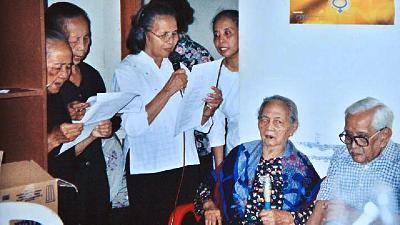
Former chairperson of the Indonesian Women’s Movement left the history of 1965 behind upon her release from prison. Umi Sardjono did not say much about the bloody event of September 30, 1965.
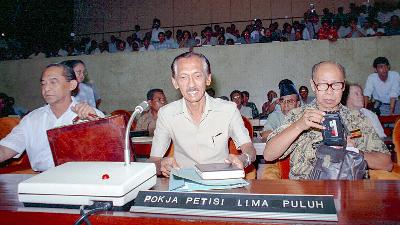
After being replaced as National Police Chief, Hoegeng Iman Santoso spent his days painting and playing music. His political activity with the Petition of 50 created a lot of difficulties in his life, including being prevented from traveling abroad.

TIDORE, the sea, the old European fort: there are still remains on this tiny, clean and calm island. Here, 500 years ago, history and the world map shaped each other, tricked each other.

The 35,000-megawatt electricity program will almost certainly miss its deadline due to a lack of funding and poor planning.

ERDHIKA Securities analyst Adrian Priatna regards the hospital business as an investment that cannot lose money. He calculated that, over the last five years, the four hospital share issuers listed on the Indonesian Stock ExchangeSiloam, Mitra Keluarga, Omni, Mayapadaall grew between 15 and 25 percent.

The two-day 'National Symposium on Dissecting the 1965 Tragedy: A Historical Approach' last week got nationwide and international attention.
It was, after all, the first time that the government hosted a forum to openly discuss and debate the mysterious and dark events of 1965.

One by one on that last evening in October 2015, the amateur performers introduced themselves. Within a very short time, the audience at the Yogya Cultural Center began to feel thoroughly amused by what they were watching.
The show was entitled 100% Yogyakarta. It did not feature any professional actors. All those up on the stage were ordinary people from around the city, including a parking attendant, a grave digger, a street tough, a housewife, a transvestite, a neighborhood association head, a teacher, and the head of a hardline Islamic organization.

Lying in state at the Adi Jasa funeral home on Tuesday, December 15, Ben Anderson was clad in a brown-colored Madura batik shirt. "That's my batik shirt," said Sugito, the driver who always accompanied Anderson since 2009 whenever he toured East Java. Sugito wiped his tears and tenderly touched the edge of the laced cloth covering the coffin.
Anderson arrived in Surabaya with his close friend, Edward Hasudingan, a.k.a. Edu, five days earlier. Both met in 2004 when Edu studied at Ithaca College in the United States. They stayed at Hotel Santika Pandegiling in Surabaya.

The International People's Tribunal 1965 a hearing last week on crimes against humanity in Indonesia following the 1965 political upheaval held in the Dutch capital of The Hague, impacted three distinct groups. The first are the condemned and the vilified, senior military officers and government officials, and even a few historians clinging to tired old slogans about 'latent dangers of communism'.
The second group are those who regard the tribunal as little more than a game, not worth their time. The third group are people who believe that the tribunal is an effort to record the facts, which in turn would lead to pressure aimed at a United Nations resolution.

The 2015 Frankfurt Book Fair ended in mid-October. As the guest of honor at the world's largest book fair, Indonesia chose the slogan '17,000 Islands of Imagination' to lead its presentation.
It was a huge success, although the team only had two years to prepare for the event, compared to the five to six years other countries had.

Hana Salomina Hikoyabi is an activist from Papua, who uses her bureaucratic savvy to get things done. She was vice chair of the Papua People's Assembly during the 2006-2011 period and is currently the head of the Regional Development Planning Board for Jayapura Regency. Hana founded the tabloid Suara Perempuan Papua (Voice of Papuan Women), to publicize issues related to violence against women, the need to acknowledge people living with acquired immune deficiency syndrome (AIDS), for information on access to justice and the conservation of Papua's mega-biodiversity.
The tabloid has been influential in changing perceptions on gender in Papua, and she is not giving up on the idea that women should continue aiming for 30 percent representation in the legislature. For her unrelenting advocacy to give voice to the women's plight in Papua, she was presented with the 2015 SK Trimurti Award by the Indonesian Alliance of Independent Journalists (AJI) at the beginning of September.

Revolution is never careful. There is no revolution carried out carefully, meticulously, and protected from going astray. Going astray is what revolution is about. Revolution does not set out to follow what has been laid out by the power that preceded it.
This is why August 17, 1945, was a revolutionary moment: on that morning the birth of a new country was declared. The rulers of the Netherlands Indies, so neat and repressive, had fallen. The Japanese military regime, so strong and cruel, had also lost. They were no more. Power relations in Indonesian changed radically.

Singapore has come a long way since its independence on August 9, 1965. During its early years, the gross domestic product (GDP) per capita was a mere US$500 and unemployment exceeded 10 percent. Like other developing countries, there were racial tensions, housing shortages, slums with poor sanitation, a high crime rate and even corruption. There were also hostile neighbors. Malaysia expelled Singapore from its Federation and Indonesia just ended its armed 'konfrontasi' with the Malaysian Federation, which at that time still included Singapore. Lastly, there was the departure of the British colonial government and its Royal Navy, which provided not only security, but also helped to drive the local economy.
Fast forward half a century later and Singapore's GDP per capita (at purchasing power parity) stands above US$56,000, the third highest in the world, with a mere two percent unemployment rate. Today, as visitors land at Singapore's Changi airport, one of the world's most efficient and modern airports, they will see a neat row of gleaming wide-bodied aircrafts belonging to Singapore Airlines, the nation's flag carrier, often voted the world's best airline. Driving from the airport, they will notice the country's efforts to turn itself into a 'garden city', with lush shady greenery along its multi-lane highways. Crossing the Kallang River visitors enter an ultra-clean and orderly modern cosmopolitan city with a state of the art broadband connectivity. Further west of the glittering city skyline is Asia's busiest container port and beyond that, is the world's third largest oil refinery complex.

The Southeast Asia (SEA) Games is not a new arena for Lim Teck Yin, 54, CEO of the Singapore Sports Council (SSC), the statutory board under the Ministry of Community Development, Youth and Sports of Singapore. This lead agency is tasked with responsibility to develop and cultivate sports for the nation. Brig. Gen. (ret) Lim Teck Yin won six gold medals in water polo at Southeast Asia's biggest sporting event. "Those six gold medals I received consecutively in the SEA Games from 1985," he told Tempo.

President Jokowi's 2015 revised government budget is his first, and, as such, is interesting to get a more detailed view of his policy spending priorities, how he expects to implement them and, more importantly, how to fund them. But, understanding where the government is spending its money this time is critical because the recent cut in fuel subsidies allows the government some real spending power to make a difference. A quick glimpse into the 288-page document, shows three areas that particularly stand out. They are infrastructure with a maritime bent, food security and social services.

Yet, this book measuring 14 centimeters x 21 centimeters is a fascinating sign of fresh creativity in the world of art, exposing the young and upcoming Indonesia artist,30-year-old Syaiful Aulia Garibaldi. He has morphed science with art in a dictionary of a newly invented language named Terhah. Words are denoted by characters derived and imagined from the changing shapes of developing micro-organisms seen through his microscope. The dictionary is the second in a series and has 1,500 words on 64 pages. It also has Indonesian and English translations in Roman script.
Syaiful new invented language, Terhah, he says is inspired by various words expressing an idea or a thought that combines with his artistic imagination. He had studied printmaking at the experimental division of the School of Fine Arts and Design at the Bandung Institute of Technology (ITB), after a stint of agronomy at the University of Padjadjaran's School of Agriculture, also in Bandung.

FOR many Indonesians, 2015 began on a positive note: subsidized fuel prices had fallen with global oil prices. Premium gasoline dropped from Rp8,500 to Rp7,600 per liter, and automotive diesel oil went from Rp7,500 to Rp7,250 per liter.
With that in mind, President Joko Widodo was optimistic 2015 would bring improvements for the Indonesian economy, with the government able to cut subsidies and free up funds. "This money can be diverted to build infrastructure such as reservoirs, irrigation, toll roads and railways outside of Java," Jokowi said.

The world has seen yet another horrific terrorist attack. This one came in Peshawar, Pakistan, when seven members of the Pakistani Taliban broke into an army-run school on Tuesday morning and went on a killing spree.
The incident took the lives of 145 people, including 132 students aged 12 to 16. One survivor, Salmannot his real namewas in a careers guidance session in the auditorium with his classmates when the gunmen stormed in. "Someone screamed at us to get down and hide below the desks," the 16-year-old boy said at the trauma ward of Lady Reading's Hospital in the city. "Then one of them shouted, 'there are so many children beneath the benches, go and get them'," he said, as quoted by AFP.

Manggi Habir*
As we close 2014 with a weak rupiah, a high domestic interest rate and a slowing economy, the only bright spot seems to be a new government with a new style of leadership that provides hope that changes will come. And, maybe the year-end is a good time to make an assessment on what we can learn for 2015. Let me start with the rupiah, as its weakness throughout the year does reflect alot of what is wrong with our economy.
On the rupiah's weakness, we must differentiate on the source of weakness where we have little control of and where we can do something. As it is always easier to blame others for our problems, the world's two largest economies would be high on the list of external sources of our currency's problems.
The US economy, because it is the only major economy that is growing well due to its loose monetary policy, has the US dollar becoming more attractive. But the Fed realizing that good things do not last forever, is concerned of potential inflation ahead and plans to raise interest rates, making the US$ even more desirable. Just remarks that it plans to raise rates has lead to massive conversions to US dollars worldwide. This year, the US dollar has strengthened against nearly all other currencies. However, as the emerging market currencies lack deep markets, the weakness is more apparent, which unfortunately includes our rupiah.

President Joko Widodo attended his first Association of Southeast Asian Nations (ASEAN) Summit in Naypyidaw, Myanmar, on November 12-13. He asserted during the meeting that Indonesia was ready to support the ASEAN Economic Community (AEC) free market in 2015. "Indonesia will not let itself be merely a market," he said.
According to Joko, an increase in inter-ASEAN trade will be the key to AEC success. "Within the next five years, I hope the value of trade between ASEAN member states can reach at least 35-40 percent," added the president. As of now, inter-ASEAN trade volume is 24.2 percent. He also urged other member states to work together in doubling the ASEAN GDP, from US$ 2 trillion to US$ 4 trillion, and reducing the poverty rate to 9.3 percent by 2030.
Rahmat Pramono, the permanent representative of Indonesia to ASEAN, said that Indonesia's readiness to face the AEC is only 82 percent. He sees the integration as an opportunity for economic growth. Sri Adiningsih, an economist from Gadjah Mada University said that Indonesia has been ASEAN's main support because of its central location in the region. "Our trade balance in the area, be it oil or non-oil, experienced surplus for a while," she said.

Pending economic problems await Joko Widodo and Jusuf Kalla's administration. In addition to the narrow room for maneuvering the budget, global economic uncertainty will be the economic challenge throughout 2015. Raising subsidized fuel prices is a policy option that must be taken as soon as possible.

Djajeng Pratomo was held at the Dachau concentration camp from 1943 to 1945. The Nazis put him to work as a nurse and carrying corpses.

As the UN's Millennium Development Goals approaches its 2015 deadline, nations are coming together to draft a new global development agenda. Democratic reform within the UN is deemed critical to the process.

Tibetans commemorate the 50th anniversary of a failed rebellion. The Chinese government is more firmly entrenched in Tibet than ever.

Indonesian students in the Netherlands published the 1925 Manifesto, considered to be more important than the Youth Pledge of 1928.

Attempts to bring to trial cases of human rights violations during the 1965 tragedy still have a long way to go. Suharto somehow managed to remain out of the justice system’s reach.

THE Adam Air Boeing 737-400 on the Surabaya-Manado route disappeared somewhere over Sulawesi. Critics put the blame on competing low-cost airfares compromising passenger safety. Ever since 2001 when the budget airline industry took off in Indonesia, the number of air travellers shot up by 130 percent and the number of flights by 26 percent. From 2001-2005 there have been 29 accidents involving national carriers. There were 26 accidents during the previous five-year period. The difference in the number of accidents may not be highly significant, but there is much to be gained from a strict monitoring on the long-term impact of the budget-airline industry.

Cemex plans to sell off its 25.5 percent share in Semen Gresik. Peter Sondakh and Bakrie are reportedly interested.

Commotion at Wiranto-Solahuddin camps across the archipelago increases in anticipation of the July 5 D-Day.

It is not easy to catch Tommy Suharto, the fugitive connected with PT Goro Batara Sakti's property-swap scam who has disappeared for nine months. Greater Jakarta Police's Special Detective Team have ransacked a number of places and tailed many people, but Tommy has proved slippery. The son of Suharto even stopped by his sister's house on July 15 for her birthday party, despite the Cendana area being the police's top priority target area. Just where have the police found Tommy's trail?
Independent journalism needs public support. By subscribing to Tempo, you will contribute to our ongoing efforts to produce accurate, in-depth and reliable information. We believe that you and everyone else can make all the right decisions if you receive correct and complete information. For this reason, since its establishment on March 6, 1971, Tempo has been and will always be committed to hard-hitting investigative journalism. For the public and the Republic.